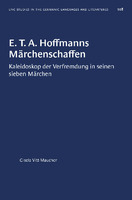E. T. A. Hoffmanns Märchenschaffen
Kaleidoskop der Verfremdung in seinen sieben Märchen
| dc.contributor.author | Vitt-Maucher, Gisela | |
| dc.date.accessioned | 2020-06-23T07:42:16Z | |
| dc.date.available | 2020-06-23T07:42:16Z | |
| dc.date.issued | 1989 | |
| dc.identifier | ONIX_20200623_9781469658575_106 | |
| dc.identifier | OCN: 581105428 | |
| dc.identifier.uri | https://library.oapen.org/handle/20.500.12657/39858 | |
| dc.language | German | |
| dc.relation.ispartofseries | UNC Studies in the Germanic Languages and Literatures | |
| dc.subject.classification | thema EDItEUR::F Fiction and Related items::FN Fiction: Traditional stories, myths and fairy tales | en_US |
| dc.subject.other | German Studies | |
| dc.subject.other | Literature | |
| dc.title | E. T. A. Hoffmanns Märchenschaffen | |
| dc.title.alternative | Kaleidoskop der Verfremdung in seinen sieben Märchen | |
| dc.type | book | |
| oapen.abstract.otherlanguage | This book provides a critical study of all seven of Hoffmann's "Kunstmärchen". Vitt-Maucher's detailed individual analyses focus on Hoffmann's use of structural, stylistic, and linguistic devices to create poetic deviations from the norms of reality. These deviations are diverse: distortions of language and time; altered dimensions of reality, persons, and objects; transformations and reversals of 'normal' conditions or conventions. They underlie Hoffmann's often humorous or grotesque world of fairy tale 'magic' and convey to the reader the poet's intent. In the course of his fairy tale production (1814–1821), Hoffmann's use of language, imagery, and structure becomes increasingly distorted and alienated from everyday reality. Similarly, his employment of humor develops from early sociocritical, ironic, and parodistic intent to more autonomous and clearly less referential forms of 'absolute humor.' | |
| oapen.identifier.doi | 10.5149/9781469658575_Vitt-Maucher | |
| oapen.relation.isPublishedBy | 29b4cf74-8c0a-422f-9d27-e862ca722861 | |
| oapen.relation.isFundedBy | 0314e571-4102-4526-b014-3ed8f2d6750a | |
| oapen.relation.isFundedBy | 0cdc3d7c-5c59-49ed-9dba-ad641acd8fd1 | |
| oapen.series.number | 108 | |
| oapen.pages | 248 | |
| oapen.place.publication | Chapel Hill | |
| oapen.grant.number | [grantnumber unknown] | |
| oapen.grant.number | [grantnumber unknown] | |
| oapen.grant.program | Humanities Open Book Program | |
| oapen.grant.program | Humanities Open Book Program |

